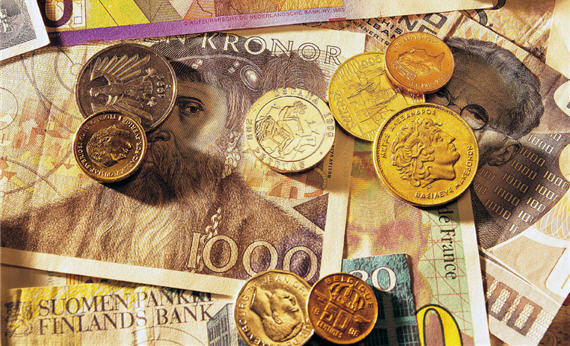Technology and Currency
Have credit cards and ATMs eliminated the value of large currency zones?
Matt Yglesias wonders if “moving the different countries of Europe into a single currency wasn’t actually a step against the tides of change,” given that “the near-universal availability of credit cards and ATMs” have eliminated the need to constantly exchange money.
It’s true that the ubiquity of electronic money removes most of the deadweight loss. But a common currency offers another huge advantage to those traveling between multiple European countries in short order: price transparency. Rather than constantly having to convert prices into, say, dollars in your head and thus having to remember several exchange rates, there’s now only one. This makes it much easier to know whether you’re getting a fair price. (And, for hyperinflated currencies like the lyra, it’s psychologically useful to have smaller units.) This is even more useful for those who actually live in the Eurozone, in that there’s no need for mental conversion at all, since the euro is their own currency.
Matt goes further and muses, “Maybe the real move for the 21st century is for large to go to smaller currency areas. It would arguably have done the ‘rust belt’ some good over the past 30 years to be able to devalue relative to higher-growth portions of the United States.” But those areas have always devalued relative to higher-growth areas. Rather than doing it by currency manipulation — which is destructive to existing stocks of money — they instead do it by price. Most things are cheaper in lower-growth areas. Wages are lower (aside from the floor of the Federal minimum wage), services are cheaper, taxes are lower, and so forth.
Housing, which for most people is the highest single expenditure, is radically cheaper in most of the country than it is in the high-growth cities. Even in the current deflationary period, houses in places like Washington, DC and New York have held most of their value. Conversely, they’re virtually giving away houses in Detroit.
Going out to dinner, getting your suit dry cleaned, or having your house rewired is cheaper in low-growth areas, too. Even medical services are substantially cheaper.
Some prices, of course, are less elastic. A given automobile costs pretty much the same thing in Boston as it does in Chicago as it does in Birmingham. But currency manipulation wouldn’t change that fact.







“moving the different countries of Europe into a single currency wasn’t actually a step against the tides of change”
This strikes me as all as a severe form of money illusion.
What John said. Just goes to show Yglesias doesn’t know diddly about finance or economics.